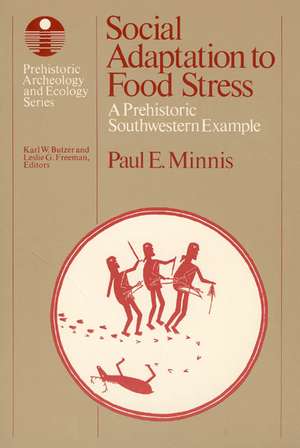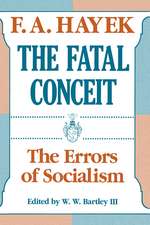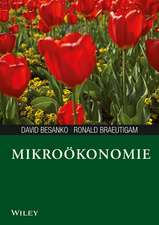Social Adaptation to Food Stress: A Prehistoric Southwestern Example: Prehistoric Archeology and Ecology series
Autor Paul E. Minnisen Limba Engleză Paperback – apr 1985
Combining anthropology, archeology, and evolutionary theory, Paul E. Minnis develops a model of how tribal societies deal with severe food shortages. While focusing on the prehistory of the Rio Mimbres region of New Mexico, he provides comparative data from the Fringe Enga of New Guinea, the Tikopia of Tikopia Island, and the Gwembe Tonga of South Africa.
Minnis proposes that, faced with the threat of food shortages, nonstratified societies survive by employing a series of responses that are increasingly effective but also are increasingly costly and demand increasingly larger cooperative efforts. The model Minnis develops allows him to infer, from evidence of such factors as population size, resource productivity, and climate change, the occurrence of food crises in the past. Using the Classic Mimbres society as a test case, he summarizes the regional archeological sequence and analyzes the effects of environmental fluctuations on economic and social organization. He concludes that the responses of the Mimbres people to their burgeoning population were inadequate to prevent the collapse of the society in the late twelfth century.
In its illumination of the general issue of responses to food shortages, Social Adaptation to Food Stress will interest not only archeologists but also those concerned with current food shortages in the Third World. Cultural ecologists and human geographers will be able to derive a wealth of ideas, methods, and data from Minnis's work.
Minnis proposes that, faced with the threat of food shortages, nonstratified societies survive by employing a series of responses that are increasingly effective but also are increasingly costly and demand increasingly larger cooperative efforts. The model Minnis develops allows him to infer, from evidence of such factors as population size, resource productivity, and climate change, the occurrence of food crises in the past. Using the Classic Mimbres society as a test case, he summarizes the regional archeological sequence and analyzes the effects of environmental fluctuations on economic and social organization. He concludes that the responses of the Mimbres people to their burgeoning population were inadequate to prevent the collapse of the society in the late twelfth century.
In its illumination of the general issue of responses to food shortages, Social Adaptation to Food Stress will interest not only archeologists but also those concerned with current food shortages in the Third World. Cultural ecologists and human geographers will be able to derive a wealth of ideas, methods, and data from Minnis's work.
Din seria Prehistoric Archeology and Ecology series
-
 Preț: 291.10 lei
Preț: 291.10 lei -
 Preț: 315.80 lei
Preț: 315.80 lei -
 Preț: 259.20 lei
Preț: 259.20 lei -
 Preț: 291.69 lei
Preț: 291.69 lei -
 Preț: 257.00 lei
Preț: 257.00 lei -
 Preț: 319.65 lei
Preț: 319.65 lei - 19%
 Preț: 174.85 lei
Preț: 174.85 lei
Preț: 273.06 lei
Nou
Puncte Express: 410
Preț estimativ în valută:
52.25€ • 56.93$ • 44.03£
52.25€ • 56.93$ • 44.03£
Carte tipărită la comandă
Livrare economică 23 aprilie-07 mai
Preluare comenzi: 021 569.72.76
Specificații
ISBN-13: 9780226530246
ISBN-10: 0226530248
Pagini: 250
Dimensiuni: 152 x 229 x 15 mm
Greutate: 0.35 kg
Editura: University of Chicago Press
Colecția University of Chicago Press
Seria Prehistoric Archeology and Ecology series
ISBN-10: 0226530248
Pagini: 250
Dimensiuni: 152 x 229 x 15 mm
Greutate: 0.35 kg
Editura: University of Chicago Press
Colecția University of Chicago Press
Seria Prehistoric Archeology and Ecology series
Notă biografică
Paul E. Minnis, an archeologist and ethnobotanist, is assistant professor of anthropology at the University of Oklahoma at Norman.
Cuprins
Series Editors' Foreword
Preface
1. Introduction
Dimensions of Food Stress
Research Limitations
Traditional Economies and Food Stress
Previous Anthropological Research on Food Stress
2. A Model of Economic and Organizational Responses to Food Stress
Human Adaptation
The Model
Ethnographic Examples of Responses to Food Stress
A Catalog of Some Common Responses to Food Shortages
Summary
3. Archeology of the Rio Mimbres Region
Research by the Mimbres Foundation
Culture History Outline
Summary
4. The Natural Environment of the Rio Mimbres Region
General Topography
Climate
Hydrology
Soils
Vegetation
Fauna
Climatic Fluctuations
Documented Prehistoric Environmental Change
Documented Historic Environmental Change
Environmental Reconstruction
5. Estimating Food Stress in the Study Area
Prehistoric Mimbres Subsistence Economy
Modeling Subsistence Failure
Summary
6. Responses to Food Stress in the Study Area
Sociopolitical Integration
Exchange
Summary
7. Conclusions
Summary of Research
Archeological Study of Food Stress
Food Stress and Southwestern Prehistory
Food Stress and Culture Change
Appendix: Plant Names
References Cited
Index
Preface
1. Introduction
Dimensions of Food Stress
Research Limitations
Traditional Economies and Food Stress
Previous Anthropological Research on Food Stress
2. A Model of Economic and Organizational Responses to Food Stress
Human Adaptation
The Model
Ethnographic Examples of Responses to Food Stress
A Catalog of Some Common Responses to Food Shortages
Summary
3. Archeology of the Rio Mimbres Region
Research by the Mimbres Foundation
Culture History Outline
Summary
4. The Natural Environment of the Rio Mimbres Region
General Topography
Climate
Hydrology
Soils
Vegetation
Fauna
Climatic Fluctuations
Documented Prehistoric Environmental Change
Documented Historic Environmental Change
Environmental Reconstruction
5. Estimating Food Stress in the Study Area
Prehistoric Mimbres Subsistence Economy
Modeling Subsistence Failure
Summary
6. Responses to Food Stress in the Study Area
Sociopolitical Integration
Exchange
Summary
7. Conclusions
Summary of Research
Archeological Study of Food Stress
Food Stress and Southwestern Prehistory
Food Stress and Culture Change
Appendix: Plant Names
References Cited
Index












